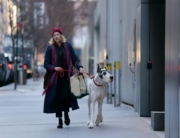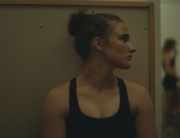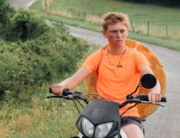
Laszlo Gyemant, left, and Andras Gyemant in The Notebook (Le Grand Cahier) (Christian Berger/Sony Pictures Classics)
Though the practice of sending children from the city to the countryside was a common one during World War II (it’s how the Pevensie children eventually made their way to the wardrobe and to Narnia), in this film, it’s the trigger for the degradation and corruption of two adolescent boys. Set in Hungary during the tail end of the war, The Notebook (Le Grand Cahier) centers on the 13-year-old twin boys (Laszlo Gyemant and Andras Gyemant), whose parents send them to live with their grandmother in the country to escape the dangers of war in this heavy-handed but chilling allegory.
While the boys’ father, a soldier, goes back to fight, their mother begs her own mother (who she hasn’t seen in 20 years) to take her children in, promising to come back when the war is over. Referred to by the villagers as a witch, Grandmother (Piroska Molnar, who adds humanity to what could have been a caricature) is a stern, alcoholic farmer, who, without real rancor, calls the boys “bastards” and slaps them to keep them in line. The two are put to work, chopping wood, and drawing water. They attempt to nourish themselves by continuing with their lessons, studying the Bible, and writing an account of their lives in a notebook that their father gave them. They are to record their experiences for him during his absence.
The film often has the tone of a fairy tale—not the saccharine pabulum of Disney but the eerie, often grotesque tales from Eastern Europe or those collected by the Brothers Grimm. Characterizations, such as Grandmother, a Baba Yaga of a woman; the trope of loved children cast out into the world; and the desolate wintry, rural setting are all examples of the folktale-like setting, though the gritty realities of war enter into the story.
Sparse on plot, the film is comprised mostly of stark, difficult-to-watch vignettes in which the boys are subjected to painful or bizarre situations. In structure and in content, it’s similar to Jerzy Kosinski’s The Painted Bird, a controversial novel about a young boy wandering from village to village in Eastern Europe during World War II, witnessing and experiencing violence. In addition to the abuse they take from their grandmother, the brothers are severely beaten when they attempt to track down a thief who’s stolen their wares. A starving German soldier they try to help dies of cold and hunger in the woods near their home, and they see firsthand examples of anti-Semitism.
There are also a number of darkly sexual moments: a German officer living next door takes an odd interest in them, and a beautiful woman takes obvious pleasure from bathing with them (an act that seems to leave the boys mostly puzzled). Their best friend, a girl referred to as Harelip (Orsolya Toth), informs them that an easy source of cash is blackmailing the lecherous deacon.
The two brothers quickly become tainted by their surroundings, almost reveling in their ability to toughen themselves. A particularly gruesome scene sees them punching and hitting each other in order to become immune to pain, and they begin killing insects and small animals, as well as standing up to their grandmother (who begins to look on them with a newfound respect)—and they only get worse from there. Big eyed and smooth skinned, they’re the picture of budding youth, yet both have truly hardened themselves. Their dead-eyed stares add an almost macabre sense of eeriness, only enhanced by the film’s score (sociopathic twins this frightening are matched only by the axe-wielding, mute Salamanca twins from Breaking Bad).
The film is visually stunning. Though Grandmother’s house and the village are marked by poverty, the scenes are gorgeous to behold, contrasting sharply with the violence and abuse taking place. The filmmakers make effective use of symbolism, though it’s rarely subtle. The opening shot of the boys sleeping nestled against each other and breathing in sync, for instance, emphasizes their seeming innocence, while several shots of the dead insects is a frightening example of how twisted they’re becoming and a stand-in for the implied, off-screen deaths we aren’t seeing.
However, the twins’ motivation is often underdeveloped. We as viewers are treated to a glimpse of their home life before they leave to the countryside: a bourgeois and attractive apartment with loving parents. The brothers are involved in so many horrific situations, which don’t adequately explain just why two seemingly well-grounded adolescents would snap—in fact, many of the worst things they experience happen after they’ve already turned. Viewers may find themselves questioning quite a lot when the credits finally roll: there’s a lot to unpack. This may not the most original treatment of the death of innocence and the corrupting influence of war, but overall this is a gripping and chilling work, taut and explosive.
















Leave A Comment